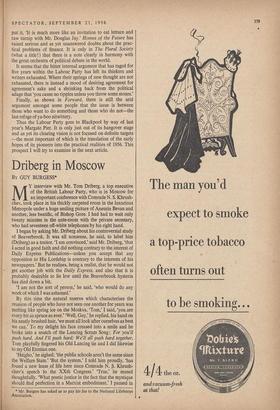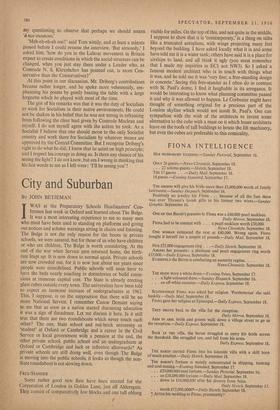Driberg in Moscow
BY GUY BURGESS* Y interview with Mr. Tom Driberg, a top executive of the British Labour Party, who is in Moscow for an important conference with Comrade N. S. Khrush- 411.
chev, took place in his thickly carpeted room in the luxurious Metropole under a huge smiling picture of Aneurin Bevan and another, less beatific, of Bishop Gore. I had had to wait only twenty minutes in the ante-room with the private secretary, who had seventeen off-white telephones by his right hand.
I began by asking Mr. Driberg about his controversial study of Beaverbrook. It was all nonsense, he said, to label him (Driberg) as a traitor. 'I am convinced,' said Mr. Driberg, 'that I acted in good faith and did nothing contrary to the interest of Daily Express Publications—unless you accept that any opposition to His Lordship is contrary to the interests of his newspapers.' But he realises, being a realist, that he would not get another job with the Daily Express, and also that it is probably desirable to lie low until the Beaverbrook hysteria has died down a bit.
`I am not the sort of person,' he said, 'who would do any work of which I was ashamed.'
By this time the natural reserve which characterises the reunion of people who have not seen one another for years was melting like spring ice on the Moskva. 'Tom,' I said, 'you are every bit as spruce es ever."Well, Guy,' he replied, his hand on his neatly brushed hair, 'we must all look after ourselves as best we can.' To my delight his face creased into a smile and he broke into a snatch of the Lancing Scrum Song: For you'll push hard, And I'll push hard; We'll all push hard together. Torn playfully fingered his Old Lancing tie and I did likewise to my Old Etonian one.
`Heigho; he sighed; 'the public schools aren't the same since the Welfare State.' But the system,' I told him proudly, 'has found a new lease of life here since Comrade N. S. Khrush- chev's speech to the XXth Congress.' True,' he mused thoughtfully. 'What poetic justice in the fact that the mystique should find perfection in a Marxist embodiment.' I paused in
* Mr. Burgess has asked us to pay his fee to the National Lifebuoys Association.
my questioning to observe that perhaps we should return nos moutons.'
`Meh-eh-eh-eh oui!' said Tom wittily, and at least a minute passed before I could resume the interview. 'But seriously.' I asked him, `how do you in the Labour movement in Britain expect to create conditions in which the social structure can be changed, when you just stay there under a Leader who, as Comrade N. S. Khrushchev has pointed out, is more Con- servative than the Conservatives?'
At this point in our discussion, Mr. Driberg's contributions became rather longer, and he spoke more vehemently, em- phasising his points by gently beating the table with a large lorgnette which he played with most of the time.
The gist of his remarks was that it was the duty of Socialists to work for Socialism in their native environments. He could not be shaken in his belief that he was not wrong in refraining from following the clear lead given by Comrade Maclean and myself. I do not myself agree with the action he took. As a Socialist I believe that one should move to the only Socialist country and work there for Socialism by whatever means are approved by the Central Committee. But I recognise Driberg's right to do what he did; .I know that he acted on high principle; and I respect his courage in doing so. Is there any chance of his seeing the light? I do not know, but am I wrong in thinking that his last words to me as I left were: T11 be seeing you'?



































 Previous page
Previous page